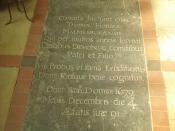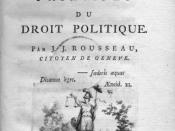HOBBES, LOCKE AND ROUSSEAU
THE STATE OF NATURE
Hobbes invites us to take place in a thought experiment where equals and nonequals are placed together in a state of nature without the existence of a state power placed over them. Hobbes believes that the people will soon lapse into a state of war where each person is threatened with violent attack. He says the conflict is caused by three basic factors, which are, competition, diffidence and glory. Competition consists in the fact that in the state of nature, if there is some resource which a person wants there are no restraints on getting it other than the physical and mental powers of other people. Glory, consists in the concern that each person has to have value for others. But arguably, more important than either of these, is diffidence. This is essentially the suspicion that another may be about to attack you, a suspicion that makes it rational for you to get in the first blow.
Locke's view of the state of nature is that man has the right to "as much as any one can make use of to any advantage of life before it spoils, so much he may by his labour fix a property in: whatever is beyond this, is more than his share, and belongs to others. Nothing was made by God for man to spoil or destroy." "Man obtained property through his labour and the availability that there was good and enough for others and that he would not appropriate more than he can use." Locke's argument is good so far, but greedy.
Locke argues that man would use the good of his labour to exchange with others and appropriate different goods. No man was allowed to appropriate more than he could trade or use. Some...



Be careful to take this essay to be accurate
This essay is great if one simply needs to know the basics of what these three political philosophers wrote about--maybe to be prepared for a class discussion, but really, it has many flaws.
There are certain assumptions made here that are simply not true. For example, the author writes that Hobbes' choice of government is the type that has people vote on a sovereign in order to protect our rights. For one, Hobbes was a supporter of absolute monarchy! Two, the author doesn't realize to what extent the protectorship goes. This isn't really what "our" governments are like today. Hobbes proposed an aboslute monarchy that, yes, provided protection, but one which could not be contested on any other grounds. So long as you were kept alive, nothing else mattered. Not your property, not your opinions on the sovereign...
This final decision on what kind of government is best is really inconsistent with his other preferences. Look out for false assumptions--especially the basics on the social contract, covenant, or compact--which is not an agreement between the governed and governors!! (It's an agreement between individuals in all cases--don't confuse civil society and government institutions).
2 out of 2 people found this comment useful.